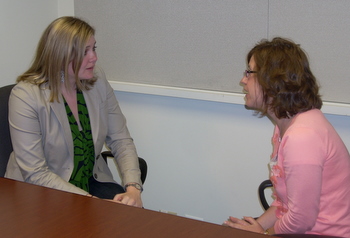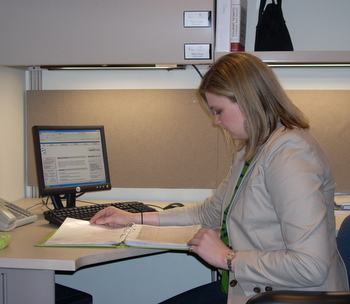Feinberg Graduate Program Prepares Students for Careers in Genetic Counseling
 |
| Taylor Sale, a student in the Graduate Program in Genetic Counseling at Feinberg, practices patient interactions with Catherine A. Wicklund, MS, CGC, assistant professor and director of the program. |
The Graduate Program in Genetic Counseling, offered through the Northwestern University Feinberg School of Medicine Center for Genetic Medicine (CGM), is the only program of its kind in Illinois and the only program in the country that offers an option to pursue a combined Master of Science in Genetic Counseling and Master of Arts in Medical Humanities and Bioethics degree. Currently 22 students — 11 first-year and 11 second-year — are enrolled in the 18-month master’s program.
Genetic counselors most commonly work in clinical settings related to prenatal, pediatric, or oncology care; however, they can also focus in other specialties such as neurology or cardiology. Genetic counselors can also work in laboratories, acting as the liaison between the lab and the physician or healthcare provider ordering a genetic test and assisting with the interpretation and writing of reports. In addition, they often work in industry, public policy, health departments, and research settings.
“Genetic counselors play a critical role in the delivery of genetic services, filling a sometimes large intellectual gap between physicians (who generally lack in-depth genetics training) and their patients’ needs for accurate, unbiased information about familial and personal risk for genetic conditions,” says Catherine A. Wicklund, MS, CGC, director of the Graduate Program in Genetic Counseling, and assistant professor in both the Feinberg Department of Obstetrics and Gynecology and in the CGM. “In a cancer setting, for example, genetic testing can help patients make difficult decisions about medical management, which is particularly important as we move toward personalized medicine and genomic medicine.”
Each year, the Feinberg Genetic Counseling Program receives more than 150 applications for a mere 22-24 openings, making the program highly competitive. Wicklund says students enter the program from a variety of backgrounds. The majority have a bachelor’s degree in biology, genetics, molecular genetics, or other science concentration. Several students have psychology degrees with minors in a related science. For those who have science-related majors, they also have completed coursework in psychology. In addition, students range from new graduates to non-traditional students who have been out of school for several years — individuals who have either a desire to make a career change or were in another genetics-related field and want to change focus.
The curriculum is a balance between clinical rotations, research, and coursework. Coursework relates to medical and molecular genetics, psychosocial issues, counseling, epidemiology, research methods, adult genetics, and professional issues.
“One of the major strengths of the program is the breadth of clinical rotations available to the students,” Wicklund adds. “We utilize many Chicago area hospitals for training; this allows our students to have a very diverse clinical experience.”
A required research project results in a written thesis and oral defense at the end of the students’ training. While many students enter the program with extensive laboratory experience, they also spend time in a genetics laboratory to gain a better understanding of molecular and cytogenetic lab techniques and interpretation of results.
“Through the students’ research projects, we have gained a better understanding of how individuals and healthcare providers view genetic disease, genetic testing, and other genetic-related topics,” Wicklund says.
 |
| Sale scans the database GeneReviews as she flips through her clinical genetics desk reference. |
Taylor Sale, a student in the program, decided she wanted to be a genetic counselor at the age of 17. She was intrigued by the genetics unit while in her high school’s advanced placement biology class. Prior to being selected into Feinberg’s program, Sale earned a bachelor’s degree in analytical and behavioral genetics from University of Colorado at Boulder and a Master of Education degree from University of Missouri-St. Louis.
Sale says Northwestern was the program that fit her best when interviewing, as she walked out of an entire day of meetings feeling energized and excited about the program.
“The program and faculty have great passion and balance,” says Sale. “There are so many people to learn from and so much support. I am constantly challenged to reach my full potential, but I know that I can talk to any one of my instructors if I need anything or start to struggle.”
Sale says the support and push from faculty extends to her clinical experiences, where she has been given the opportunity to put all the knowledge she’s gained in the classroom into practice.
“Interacting with patients has given me a lot of confidence and pushes me to keep sharpening my skills and seeking out new information,” says Sale. “Above all, the clinical experiences remind me what I’m working for, which keeps me focused.”
Sale’s thesis project is focused on amyotrophic lateral sclerosis (ALS), looking at risk perceptions of siblings and children of ALS patients. Sale holds a work-study position in an ALS research lab and has a great deal of interest in the disease. She is also working with one of her bioethics professors on a project that investigates the ethics of administering a drug that may not have been through proper clinical trials to pregnant women. This study will likely be the focus of her medical humanities and bioethics thesis.
Beyond the classroom, laboratory, and clinic, Sale says it’s the bond that she’s developed with her classmates that has solidified for her that the decision to choose Feinberg was the right one.
“We all have different strengths, but we complement each other,” Sale says of her fellow students. “Throughout my time here, my classmates have become my best friends. They are the people I de-stress with, the people I study with, the people I learn from, and, mostly, the people I laugh with.”






